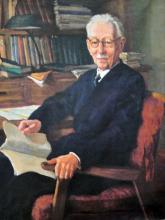Wojciech Sventoslavsky was born in Zhytomyr in 1881. He studied at the Chemistry Department of the Kiev Polytechnic Institute and graduated in 1906 with the degree of engineer-technologist and a diploma of I degree. While still a student he began actively engage in research, published two articles co-authored with his supervisor Professor V.G.Shaposhnikov. In 1908 he began working in the KPI as an assistant chair of the dye technology. Subsequently he was promoted to assistant lecture of the Department of Inorganic Chemistry, was elected professorial Fellow in thermochemistry, supervised graduate work in physical chemistry. Soon Wojciech Sventoslavsky became famous for his work on the thermochemistry of organic matter, and in 1911 even received a minor prize of Mendeleev. He was valued as an exceptionally gifted experimenter. In 1917 he presented at the Physics and Chemistry Department of Kiev University master's thesis "diazocompounds - thermochemical studies". After its defense he was awarded at once the doctorate in chemistry. He worked at the universities of Moscow, Warsaw, was the rector of Warsaw University of Technology, the Minister of Education of Poland. During World War II, he taught at American universities. On his return he taught at the University of Warsaw, he worked in the Polish Academy of Sciences. He was vice-president of the International Union of Pure and Applied Chemistry. At the same time he never forgot his alma mater, and in the early 20-ies of the last century was one of the founders of the KPI graduates group in Poland.
In the history of world science Wojciech Sventoslavsky entered as the founder of thermochemistry of organic compounds, the founder of a new direction of physical chemistry - poliazeotopy. He is the author of the method Calorimeters measurements and the theory of carbonization processes coal tar processing, the inventor of micro calorimeters. For his achievements he was twice nominated as the candidate for the Nobel Prize, was twice winner of the State Prize of scientific Poland (1951, 1953).

